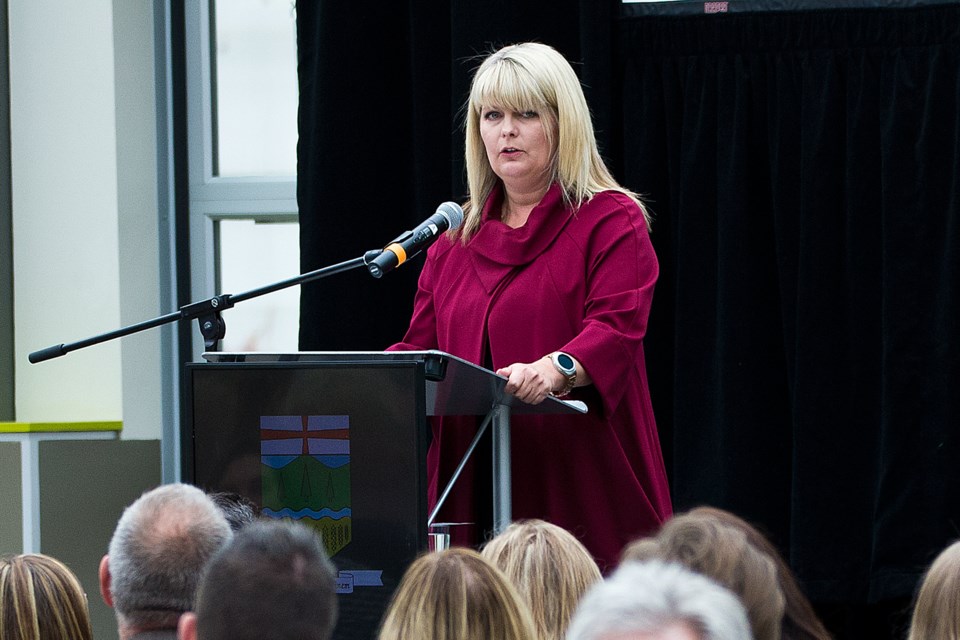St. Albert Mayor Cathy Heron doesn't think the provincial budget was as austere as everyone expected it was going to be – except when it comes to funding for municipalities
“Municipalities were singled out,” she said. “We're going to be forced to some difficult decisions in the future.”
On Feb. 25, the province released its 2021-22 budget. The budget shows the Municipal Sustainability Initiative (MSI) program will be extended for three years and, after an initial increase in funding, municipalities will see 44 per cent drop in funding for the following two years.
“We'll get about $18 million total for this year – which is a bit of an increase. But then we go down to – I have to confirm with my finance department – but I think we go down to around $4.6 million; that's a big drop from $18 million,” said Heron.
The MSI program is a main source of operating and capital funding for municipalities. The program was slated to end this year and be replaced with the Local Government Fiscal Framework (LGFF) program, but this budget revealed MSI is being extended until 2024.
The province announced MSI funding is increasing by $200 million to $1.2 billion this year. For the 2022-23 and 2023-24 budgets, that amount will be slashed to $485 million. Taken all together, this equals a 25-per-cent reduction over the course of all three years.
Heron said she wasn’t expecting that level of a drop.
“I thought it would be like a 10 to 15 (per cent drop in funding). So, 25 (per cent) was hard,” she said.
One of the biggest disappointments Heron had with the budget announcement was the decision to postpone LGFF, as it was meant to be a predictable grant with funds that grew with the economy.
“LGFF was a bit of a win for cities. It was – we were expecting, again, a bit of a decrease – but the nice part about LGFF was it was legislated. It was predictable. Now, it's at the whim of the government,” she said.
Heron was also disappointed with cuts made to affordable housing dollars.
“I was hoping to build some projects here in St. Albert, or even in the region, to help some of our homeless people. And I think over the next few years it is pretty much going down to nothing,” she said.
The city won’t be spending its full $18 million in MSI funding this year, said Heron. They will carry some of it forward to cushion the blow of the following years.
“We'll try to cushion the next couple years, because to get $4.6 million to do all our infrastructure in St. Albert – we use that money for the bare-bones needs of the city, like road repairs, and sidewalk improvements, and just the really the bare bones that you need to keep the city running – we can't do that on $4.6 million,” she said.
Heron said she understands what the province is doing, but it is going to force the city to get aggressive in looking for other sources of revenue. She said they were ahead of the game by adding a 1.5-per-cent tax levy over the last couple of years to make up some of the grant cuts, but it will not cover what was just lost in MSI funding.
“We're going to have to try to find other sources of revenue, and we don't want to turn to property taxes. We can't rely on government grants. So, there's other options out there that we're going have to explore,” she said.
“We have to have a council and, actually, a population that's ready to see us do business slightly different. Otherwise, service levels are going to drop, and infrastructure is going to crumble. And when that happens, you can't attract investments; it's counterintuitive to recovery.”
An example Heron gave of attracting investment is the twinning of Ray Gibbon Drive. Almost immediately after the province and the city partnered up on the project, Uline, a major distributor of shipping, industrial and packaging materials, came in.
“That's a perfect use for MSI money. When we partnered (with the province) there almost immediately, we brought in Uline, which is the single biggest investment in St. Albert's history, and it will probably be the biggest employer in the city. So, there is a direct correlation between investing in infrastructure and economic growth,” she said. “There's also the exact opposite.”
If the next phase of Ray Gibbon Drive from LeClair up to McKenney doesn’t get finished, Heron is worried.
“If that doesn't get done, we don't invest in those kinds of projects, then you're not going to be able to get anybody to want to set up shop in the Lakeview Business District because there's no access,” she said.
“That's our next big push, to get non-residential assessment in Lakeview Business District and we need to make sure it's not just roads, it's sewer lines and water lines and broadband. All those kinds of things that make a business park attractive, and I’m talking foreign investment.”




